
Полная версия
Idioms and phrasal verbs in business communication
Exercise 7. a) Translate the following sentences into your native language.
– The company’s old IT system cries out for a complete upgrade.
– The fall in profits was down to increased competition in the market.
– The new CEO decided to do away with the formal dress code.
b) Translate the following sentences into English using a suitable idiom or phrasal verb from the vocabulary list.
– (UZ) Uning ehtiyotkorsiz sharhi jamoada qizg‘in bahs-munozaraga sabab bo‘ldi.
(RU) Его неосторожный комментарий спровоцировал бурную дискуссию в команде.
– (UZ) Narxlar pasayganda, biz ko‘proq mahsulot sotib olamiz.
– (RU) Когда цены снизятся, мы закупим больше продукции.
– (UZ) Ijobiy mijoz fikrlari yomon matbuot ta’sirini yo‘qqa chiqardi.
– (RU) Положительные отзывы клиентов нейтрализовали эффект плохой прессы.
Exercise 8. Reading and Understanding.
A lot of key people get bogged down in meaningless meetings. What should be done? All meetings cry out for a leader who will clamp down on discussions that go off-topic. This is the duty of the chairperson, who truly has his work cut out for him.
The chairperson must not keep the purpose of the meeting under wraps. It should be stated clearly. If the purpose is clear, the group itself will brush away irrelevant ideas. When it comes to discussions, the chairperson must let one suggestion spark another. They must ensure that loud members, who get carried away, do not dominate or cut off ideas from others. If some unrealistic idea crops up, the chairperson must politely do away with it to keep the discussion realistic. Remember that an unsuccessful meeting is often down to the incompetence of the chairperson. Bad leadership will cancel out any chance of a productive meeting.
Comprehension Questions:
– According to the text, what is a key duty of a chairperson regarding the discussion?
– What should a chairperson do when an unrealistic idea «crops up»?
– Who is usually responsible («is down to») when a meeting is unsuccessful?
Exercise 9. Complete the dialogue using the phrasal verbs from the box. Use each phrase only once.
got bogged down, cut off, cries out for, do away with, crop up
Manager: How is the project planning going, Sarah?
Sarah: It’s been slow. We _____________ in a debate about the budget for two days.
Manager: I see. This situation _____________ a clear decision. We need to move forward.
Sarah: I agree. And some new technical issues have started to _____________.
Manager: Okay, Let’s _____________ the old plan and start fresh with a new approach. I don’t want to be _____________ by bad news again, so Let’s focus on solutions.
Exercise 10. Imagine you are at a meeting. You have two minutes to give a speech on «The 3 Golden Rules for an Effective Chairperson.» Prepare a short speech (a «pitch»). You must use at least FOUR of the vocabulary items from this lesson.
Use this plan to develop your ideas:
– Introduction: State the importance of the chairperson’s role. (e.g., «A meeting often cries out for strong leadership to avoid getting bogged down…»)
– Rule 1: Present your first rule. (e.g., «First, a chairperson must not brush away new ideas, even if they seem strange…»)
– Rule 2 & 3: Present your other rules. (e.g., «Second, they must clamp down on anyone who tries to cut off another speaker…»)
– Conclusion: Summarize the benefits. (e.g., «Following these rules is down to the chairperson, and it ensures no one’s time is wasted.»)
LESSON 4. PROBLEM-SOLVING MEETINGS
Lesson Aims:
– To learn and master 11 idioms and phrasal verbs related to problem-solving and decision-making.
– To practice using the target vocabulary in controlled and semi-controlled exercises.
– To develop comprehension and translation skills.
– To apply the new vocabulary in a practical speaking or writing task.
Ex.1 Warm-Up. Instructions: Discuss the following questions with a partner.
– What’s the best way to deal with a problem that crops up unexpectedly in the middle of a project?
– Imagine your team is launching a major new product. How would you leave nothing to chance?
– Why is it important for a company to come to grips with changes in the market?
Exercise 2. Study the following vocabulary items. Note down their definitions and translations to memorize them. Make 6 sentences using active vocabulary.
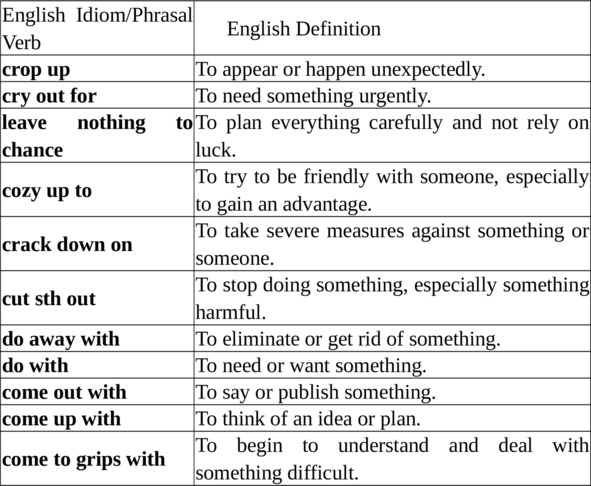
Ex.3 Vocabulary Translation

Exercise 4. Match the idioms and phrasal verbs on the left with their correct definitions on the right.
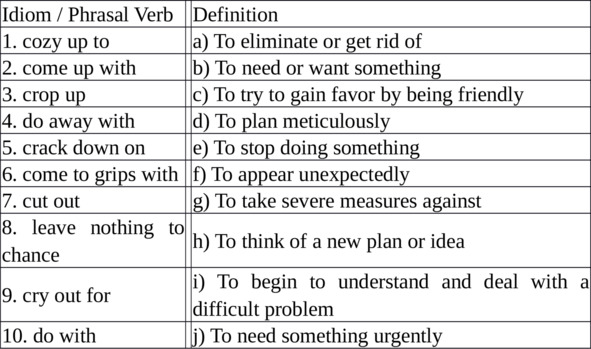
Exercise 5. Complete the sentences using the correct idiom or phrasal verb from the box.
come out with, come up with, cozy up to, cried out for, leave nothing to chance, do away with, come to grips with
– Our company needs to _____________ the reality of the new market competition.
– The old filing system was so inefficient that it _____________ replacement.
– The project manager is so meticulous; she tries to _____________.
– Tomorrow, the CEO will _____________ a statement about the company’s future.
– He was seen trying to _____________ the director, probably hoping for a promotion.
– We need to _____________ a better solution than this.
– The new policy will _____________ all the old, complicated forms.
Exercise 6. Rewrite each sentence using the idiom in parentheses so that it has the same meaning.
Example: They had to cancel the flight due to bad weather. (call off)
→ They had to call off the flight due to bad weather.
– We need more time to finish this report. (do with)
– The city council decided to take severe measures against illegal parking. (crack down on)
– You should stop eating so much junk food. (cut out)
– Several new opportunities appeared after we launched the website. (crop up)
– It took me a while to understand and handle the new software. (come to grips with)
Exercise 7. a) Translate the following sentences into your native language.
– The team was asked to come up with some new ideas for the ad campaign.
– For this launch to be a success, we must leave nothing to chance.
– The government plans to crack down on tax evasion.
b) Translate the following sentences into English using a suitable idiom or phrasal verb from the vocabulary list.
– (UZ) U o‘zining eski, samarasiz ish uslublarini yo‘q qilishi kerak.
– (RU) Ему нужно избавиться от своих старых, неэффективных методов работы.
– (UZ) Bizning boshqaruvimiz yangi g‘oyalarga juda muhtoj.
– (RU) Наше руководство отчаянно нуждается в свежих идеях.
– (UZ) Kompaniya kecha yangi mahsulot haqida e’lon qildi.
– (RU) Вчера компания выступила с анонсом нового продукта.
Exercise 8. Reading and understanding.
When a complex problem crops up, you must leave nothing to chance. An approach that this situation cries out for is to define the problem and analyze information. Unlike idea-generating meetings, the goal of a problem-solving meeting is clear. For example, if there is friction between departments, the goal is to improve how they relate. It’s up to the groups to come up with methods to overcome obstacles. Everyone expects action to follow the meeting – a commitment to do away with the problem.
Sometimes, there are external constraints like time or money. For example, if you know a competitor will soon come out with a new product, you could do with a problem-solving meeting. Don’t waste time. You must come to grips with the situation. You and your team should convene a meeting to crack down on your rival’s potential advantage by changing your strategy urgently.
Comprehension Questions:
– According to the text, what is a key difference between an idea-generating meeting and a problem-solving meeting?
– What kind of «external constraints» can limit the possible solutions to a problem?
– What is the recommended course of action when a competitor is about to release a new product?
Exercise 9. Complete the dialogue using the phrasal verbs from the box. Use each phrase only once.
come up with, crack down on, do away with, do with, crop up
Manager: Our team’s productivity has been low. We need to _____________ a solution.
Anna: I think we could _____________ more modern tools. Our current software is very old.
Mark: That’s true. We should just _____________ the old system completely. But new problems will probably _____________ during the transition.
Manager: We’ll handle them. I also want to _____________ employees who miss deadlines. That has to stop.
Exercise 10. Imagine you are at a meeting. Your team is facing a serious problem (e.g., falling sales, a new competitor, negative customer feedback). Prepare a short speech (a «pitch») to motivate your team and outline a plan. You must use at least FOUR of the vocabulary items from this lesson.
Use this plan to develop your ideas:
– Acknowledge the Problem: State the difficult situation. (e.g., «Team, we need to come to grips with the fact that our main competitor is gaining market share…»)
– Stress the Urgency: Explain why action is needed now. (e.g., «This situation cries out for a new strategy…»)
– Propose a Solution: Suggest a course of action. (e.g., «I believe we need to do away with our old marketing approach and come up with something completely fresh…»)
– Call to Action: State the immediate next step. (e.g., «Let’s use this meeting to brainstorm. We will leave nothing to chance.»)
Unit 2. TELEPHONING
LESSON 5. A GOOD TELEPHONE PERSONALITY
Lesson Aims:
– To learn and master 11 idioms and phrasal verbs related to communication and managing tasks.
– To practice using the target vocabulary in controlled and semi-controlled exercises.
– To develop comprehension and translation skills.
– To apply the new vocabulary in a practical speaking or writing task.
Ex.1 Warm-Up. Instructions: Discuss the following questions with a partner.
– How do you keep up with the news in your industry or field of study?
– Can you describe a time when you were completely snowed under with work or studies? How did you manage it?
– In any project, what does success ultimately boil down to?
Exercise 2. Study the following vocabulary items. Note down their definitions and translations to memorize them. Make 6 sentences using active vocabulary.
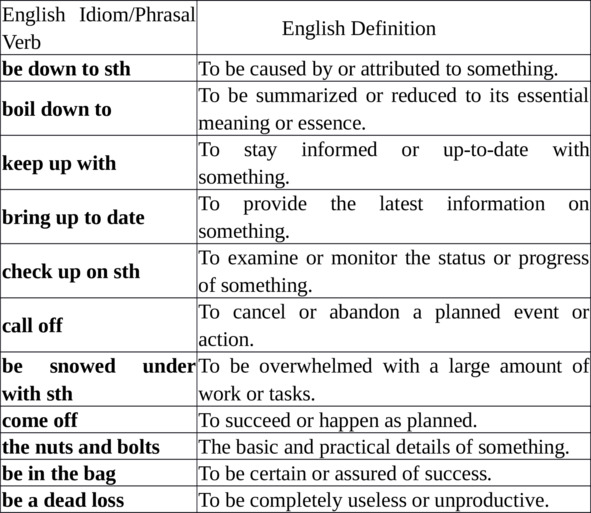
Ex.3 Vocabulary Translation
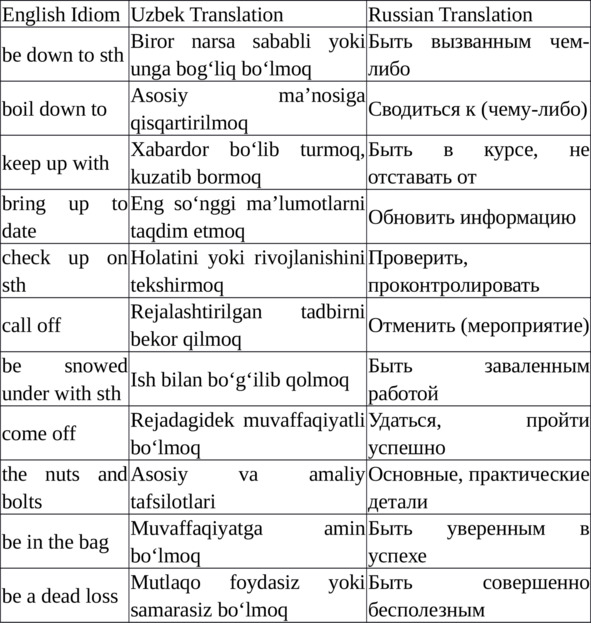
Exercise 4. Match the idioms and phrasal verbs on the left with their correct definitions on the right.
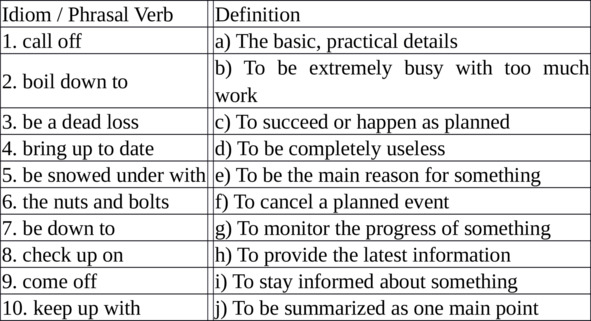
Exercise 5. Complete the sentences using the correct idiom or phrasal verb from the box.
is down to, boils down to, keep up with, check up on, came off, in the bag
– Our recent success _______________ the team’s hard work and dedication.
– The entire argument _______________ a simple misunderstanding.
– I read industry magazines to _______________ the latest technological advancements.
– The presentation _______________ perfectly, just as we had rehearsed.
– After we secured the main investor, we knew the project was _______________.
– Could you please _______________ the production team and see if the order is ready?
Exercise 6. Rewrite each sentence using the idiom in parentheses so that it has the same meaning.
Example: They had to cancel the flight due to bad weather. (call off)
→ They had to call off the flight due to bad weather.
– I have too much homework this week; I’m overwhelmed. (be snowed under with)
– Could you provide me with the latest information on this case? (bring up to date)
– That old marketing strategy was completely unproductive. (be a dead loss)
– I need to understand the basic details of how this system works. (the nuts and bolts)
– The problem was caused by a faulty component. (be down to)
Exercise 7. a) Translate the following sentences into your native language.
Конец ознакомительного фрагмента.
Текст предоставлен ООО «Литрес».
Прочитайте эту книгу целиком, купив полную легальную версию на Литрес.
Безопасно оплатить книгу можно банковской картой Visa, MasterCard, Maestro, со счета мобильного телефона, с платежного терминала, в салоне МТС или Связной, через PayPal, WebMoney, Яндекс.Деньги, QIWI Кошелек, бонусными картами или другим удобным Вам способом.

